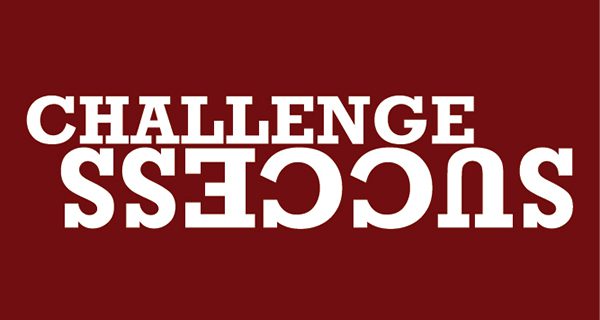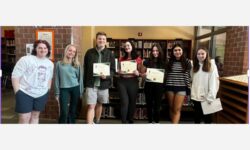By Rama K. Ramaswamy
Challenge Success, a new initiative at Wellesley High School (WHS), in partnership with Wellesley Education Foundation (WEF), will address the growing concern regarding increasing levels of stress and anxiety. A nationwide program based at Stanford University and co-designed by a former high school English teacher, Denise Pope, Ph.D., Challenge Success seeks to help communities expand their often narrowly-defined notions of success and offers practical, research-based solutions and interventions to reduce stress and increase student engagement and well-being. Challenge Success partners with schools and families to provide kids with the academic, social, and emotional skills needed to succeed now and in the future.
Thanks to a generous grant from WEF, and support by the Wellesley High School PTSO, Pope will be at the WHS library on January 24 at 7 p.m. to discuss and launch Challenge Success. According to the CS model, excessive focus on grades and performance deprive children of the time and energy they need to tackle the demanding work of growing up. Pope’s presentation will discuss how to establish and structure a healthier home environment for school-aged children, how to reduce academic stress without sacrificing achievement and how to increase resilience, creativity and wellbeing for all children.
Pope specializes in student engagement, curriculum studies, qualitative research methods, and service learning. Pope lectures nationally on parenting techniques and pedagogical strategies to increase student health, engagement with learning, and integrity. She is a 3-time recipient of the Stanford University School of Education Outstanding Teacher and Mentor Award and was honored with the 2012 Education Professor of the Year Educators’ Voice Award from the Academy of Education Arts and Sciences.
Wellesley sent a team of school administrators and high school educators, students, and parents to the Challenge Success fall conference at Stanford University in November 2016. WHS parents, administrators and teachers feel that as one of only 140 schools from across the nation to partner with Challenge Success, “we are fortunate to be a part of this pioneering school-based reform project and look forward to sharing our ongoing work with the community.”
Key participants include, Dr. Chisum, WHS Principal, Dr. Dabrowski, Assistant Superintendent of Wellesley Public Schools, Kathleen Brophy, WHS Faculty member, Craig Brown, WHS Faculty Member, Amanda Brown, WHS Faculty Member, Darlene Howland and Annie Hall, WHS parents, and Olivia Gieger and Delian Simpson, both WHS students.
According to WHS English teacher Amanda Brown, “I came to Challenge Success two years ago as a parent of a first grader at Pine Hill School in Sherborn. I attended Denise Pope's ‘Well-balanced Child’ presentation at Dover-Sherborn and left there grateful to be a parent of young children in a district so thoughtful about its students' experiences in and out of school. I also left feeling that Denise's expertise could help make school a better experience for students, teachers, and parents in Wellesley. I think what I found most compelling was that everything Challenge Success stands for is grounded in research and that healthy child development is at its heart. As a parent and a teacher, I see how fleeting and important childhood is to building resilient, engaged (and engaging!) adults. I want to protect that time for our kids to grow into themselves. As a teacher here, I feel like, increasingly, it's all about the grade. Students are figuring out what they need to do to get an A grade, but not finding joy in the learning process. It seems like they are checking the boxes they think they need to check to be ‘successful’, but not thinking outside the box about what success means to them. As Denise says, they are really good at ‘doing school’, but not going beyond that. They are afraid to take risks that might ‘mess up’ their perfect resumes. I see anxiety, sadness, and a lack of engagement punctuated by moments of curiosity, discovery, and joy. What would school be like if the opposite were true? If curiosity, discovery, and joy were front and center?” Brown added to this by defining the CS motto: “here's our working vision statement: we believe in a school where students, educators, and parents are fully engaged in learning; where teachers and parents work together to help students craft their authentic selves, and where it is ok to be yourself, take risks, make mistakes, find joy and grow.”
“I have worked in Wellesley for the past 18 years now, and one can't work at Wellesley High School or live in this town without realizing there are a lot of pressures, stresses, and expectations put on our teenagers,” said Principal Jamie Chisum. “Sometimes, it is good, and sometimes, it can be overwhelming. The overwhelming moments have been the ones that kept me up worrying about those kids and their families. Those moments led me to believing Challenge Success was worth pursuing. We plan to move slowly with our steps. We need to analyze the data. We need to triangulate it with other data we have like the Metrowest Health Survey and internal measures like attendance, behavior and grades. We may decide we need more information because the survey data brings up more questions rather than answers so we'll try to find a way to gather what we need. We'll see what emerges and go from there. I think the Challenge Success principles around encouraging kids to be happy and healthy while they work hard to achieve the great things we all want for them are already things we value. I think our families want a well-balanced kid. I think they want their children to feel empowered. I know one of the goals of WHS is help our students become empowered young adults.”
Parent Annie Hall said: “I first heard about Challenge Success last year when I was WHS PTSO Co-President. Dr. Chisum approached the PTSO for support with the program after WEF approved the grant to bring Challenge Success into the high school.” When asked what inspired her to get involved, she said, “there is no denying that we need to address stress and anxiety in our high school students at Wellesley High School. As PTSO Vice President and Co-President, I attended many presentations addressing the social emotional wellbeing of students at WHS. The results of the MetroWest Adolescent Health Survey indicate that anxiety is on the rise in the high school, especially with girls. Each year, we have 20-30 students passing through the WHS Bridge Program and a high number of students who visit the nurse’s office for emotional support. Anecdotally, I spoke with many parents last year and they expressed concern for their teen, with respect to stress and anxiety.” In addition, Hall said, “Challenge Success is student empowerment. Wellesley High School students recently completed the The Stanford Survey of Adolescent School Experience that will provide us with data identifying sources of their stress and anxiety. Based on the results of the survey, students, parents, faculty and administrators will work together to address WHS student needs with the ultimate goal of reducing stress and anxiety and increasing overall student engagement in school.”
To learn more about Challenge Success, visit http://www.challengesuccess.org and attend Dr. Pope’s presentation at the WHS library on January 24 at 7 p.m.

























